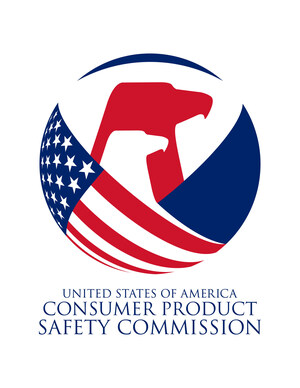WASHINGTON, March 18, 2014 /PRNewswire-USNewswire/ -- National Poison Prevention Week (NPPW) is March 16-22, 2014, and the U.S. Consumer Product Safety Commission (CPSC) is encouraging consumers to use this time to "Prepare and Prevent" exposure to poisonous products in the home. Annually, an estimated 90,000 children are seen in emergency departments nationwide due to unintentional poison exposures, many of which occur in the home.
From the familiar to the more innocent looking, poison dangers can lurk throughout the home. To reduce the risk of unintentional poisoning, CPSC has created an online Poison Prevention Safety Education Center to help consumers identify potential poison risks and take simple steps to prevent exposure.
"Child-resistant caps on medicine and cleaning products have saved thousands of lives, but there is still more we can do to safeguard and prevent children from being exposed to poisons in the home," said CPSC Acting Chairman Robert Adler. "A few simple and inexpensive precautions can mean the difference between a child's life or death."
Consumers are urged to think outside of the box─beyond the medicine and kitchen cabinets─when it comes to poison prevention efforts. Coin-size button batteries used in all sorts of electronics, such as keyless-entry devices, remotes and gaming controls, musical greeting cards, and other products placed within a child's reach, have been associated with thousands of pediatric poisoning incidents. Potentially fatal chemical burns from a coin cell battery lodged in the throat can occur in as little as two hours.
CPSC encourages parents to identify products in the home that carry these small batteries and keep these products out of a child's sight and reach. CPSC further encourages parents to secure any loose batteries found around the house and to keep them safely out of sight and reach.
In the laundry room, new and emerging hazards associated with highly concentrated single-load liquid laundry packets have prompted numerous warnings from CPSC. These packets, first sold in the United States beginning in early 2012, have led to thousands of children being treated in emergency departments nationwide due to exposure to the poisonous contents of the packets. To address this hazard, CPSC has worked with product manufacturers on immediate and long-term efforts. Now consumers are able to see store shelves stocked with laundry packets with redesigned packaging. The addition of new, opaque packaging and uniform warning icons is intended to deter a child's interest in the product and raise consumer awareness of the hazard. But we still need consumers to be vigilant and keep laundry packets away from a child's reach.
Carbon monoxide (CO) is a colorless, odorless gas created by fuel-burning products, such as portable generators, furnaces, and cars. Exposure to high levels of poisonous carbon monoxide in an enclosed space can be fatal within minutes. The Centers for Disease Control and Prevention (CDC) estimates that there are more than 400 CO-related fatalities per year. CPSC estimates that each year, 170 deaths are associated with consumer products. Portable generators are the leading consumer product involved in CO poisonings, and they can create hazardous exposures in enclosed spaces even when operated outdoors. A generator placed too close to a window, door, vent, or other opening can result in high CO levels inside the home. CO alarms help detect dangerous levels of carbon monoxide in the home and should be installed on every level of the home. Batteries should be replaced every year.
Quick and easy steps, such as installing CO alarms, placing coin cell batteries and laundry packets out of reach and out of sight of children, and resealing child-resistant containers can help prevent unintentional poisoning incidents. Consumers are urged to visit CPSC's online Poison Prevention Safety Education Center and to use the safety guides as an aid in spotting and remedying hidden poison hazards.
CPSC is again partnering with product safety agencies North and South of America's borders to raise awareness about unintentional poisonings. CPSC, Health Canada and Mexico's Procuraduria Federal del Consumidor (PROFECO) will deliver warnings and prevention tips through social media using the hashtag #PreventPoison. Through coordinated messaging, CPSC is continuing the effort to make North America the safest continent for consumer products.
The U.S. Consumer Product Safety Commission is charged with protecting the public from unreasonable risks of injury or death associated with the use of thousands of types of consumer products under the agency's jurisdiction. Deaths, injuries, and property damage from consumer product incidents cost the nation more than $1 trillion annually. CPSC is committed to protecting consumers and families from products that pose a fire, electrical, chemical or mechanical hazard. CPSC's work to help ensure the safety of consumer products - such as toys, cribs, power tools, cigarette lighters and household chemicals – contributed to a decline in the rate of deaths and injuries associated with consumer products over the past 40 years.
Federal law bars any person from selling products subject to a publicly-announced voluntary recall by a manufacturer or a mandatory recall ordered by the Commission.
To report a dangerous product or a product-related injury go online to www.SaferProducts.gov or call CPSC's Hotline at (800) 638-2772 or teletypewriter at (301) 595-7054 for the hearing impaired. Consumers can obtain news release and recall information at www.cpsc.gov, on Twitter @USCPSC or by subscribing to CPSC's free e-mail newsletters.
Media Contact
Please use the phone numbers below for all media requests.
Phone: (301) 504-7908
Spanish: (301) 504-7800
Logo - http://photos.prnewswire.com/prnh/20030904/USCSCLOGO
SOURCE U.S. Consumer Product Safety Commission
WANT YOUR COMPANY'S NEWS FEATURED ON PRNEWSWIRE.COM?
Newsrooms &
Influencers
Digital Media
Outlets
Journalists
Opted In





Share this article